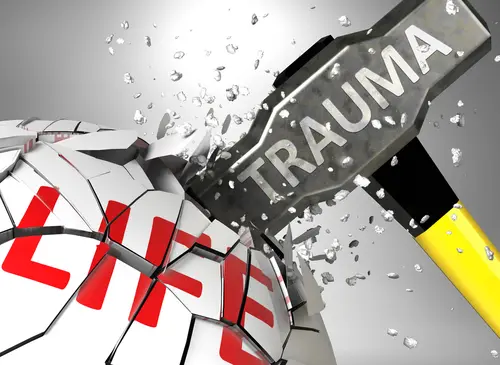Collective trauma is the psychological and emotional harm resulting from a group’s shared experience of a traumatic event. It may involve a small group, like a family, or affect the community or society as a whole.
Collective trauma can have a significant impact, causing many emotional, psychological, and social problems. The effects of collective trauma can also be long-lasting and may be passed down through generations. These may include feelings of helplessness, hopelessness, guilt and grief, as well as increased levels of anxiety, depression, and post-traumatic stress disorder (PTSD).
However, communities and individuals can also develop resilience and find ways to cope and heal from these experiences through support networks, counselling, and other forms of intervention.
Examples of Collective Trauma
Events that cause collective trauma vary widely, ranging from multigenerational events such as slavery to stand-alone experiences like a family house fire.
Several events can cause collective trauma, some of which include:
Natural disasters – earthquakes, hurricanes, floods, and wildfires can cause trauma for those directly affected and those who witness the aftermath.
Acts of terrorism – events like the 9/11 attacks in the United States, the 2005 London bombings, and the 2015 Paris attacks can cause trauma for those who experience the violence firsthand or witness it through media coverage.
War and conflict – armed conflicts such as the Vietnam War, World War I and II, and ongoing conflicts in the Middle East can cause trauma for soldiers, civilians, and entire communities.
Genocide and mass violence – events such as the Holocaust, the Rwandan genocide, and the Srebrenica massacre can cause trauma for entire communities and leave lasting psychological scars. The trauma of the Holocaust remains for many descendants of those imprisoned and killed.
Pandemics – outbreaks of contagious diseases such as COVID-19, SARS and HIV have caused trauma for individuals and entire communities due to the fear and uncertainty of the viruses and the social, psychological and economic impacts. The AIDs epidemic – particularly in the 1980s and 90s – caused profound fear and trauma for LGBTQ+ individuals, which many people from that community felt for decades. The isolation so many experienced during the COVID-19 pandemic has increased rates of loneliness, mental health conditions, and alcohol consumption.
Effects of Collective Trauma on Mental Health
Collective trauma can impact our daily lives in various ways as individuals all process trauma differently.
Knowing how to identify the effects of trauma can help us heal. There are a number of mental health issues that can arise as a result of collective trauma, such as:
Psychological Distress
No matter the size, any traumatic event can cause those involved to display signs of PTSD. Although not everyone will develop it (the figure varies between studies and populations), between 10-20% of people who experience trauma develop PTSD, with most experiencing a level of distress, decreased levels of wellness, feelings of insecurity or being unsafe.
Substance Abuse
Some people turn to substance use to cope with emotional and psychological distress. Certain substances, including alcohol, opioids and benzodiazepines, can temporarily relieve anxiety, distress, dread, guilt and other trauma symptoms. This can lead people to self-medicate, using these substances as a way of coping.
Certain collective traumas can also disrupt social infrastructure and support systems, making it more difficult for people to access resources and mental health support. This can leave individuals feeling isolated and disconnected, increasing the risk of substance abuse and other unhealthy coping mechanisms.
When a collective trauma creates an environment of chaos and stress – such as the recent earthquake in Turkey and Syria – the stress of living in a traumatised community can increase the risk of substance misuse and mental health conditions. A high-stress environment can create a sense of all-consuming trauma, as it can feel like there is no relief from the feeling of hopelessness and lack of control.
Anxiety Disorders
Trauma causes significant stress to the nervous systems, and collective trauma is no different. PTSD can trigger panic attacks, anxiety, and flashbacks around activities or places related to the trauma; for example, being near the sea after a tsunami, going on a plane after 9/11, or returning to school after a mass shooting. For many people, these activities may be part of their daily life, so dealing with the effects of the trauma is essential for returning to normality and regaining control.
Low Self-esteem
Low self-esteem is often linked to trauma. With collective trauma, many people face a sense of guilt, incompetency or helplessness that they could not deal with the situation or help others during the event.
Intergenerational Trauma
People who have lived through traumatic experiences may pass their trauma responses on to future generations.
Studies show that exposure to trauma can cause certain genetic information to be passed on to the next generation. Epigenetic research has found a plethora of evidence that trauma can modify gene expression. Studies documenting this change have found evidence ranging from a gene linked to the release of cortisol, which is involved in the flight-flight-freeze reaction, to a gene involved in fat storage.
Increased Community Connection, Resilience and Creativity
Collective trauma can also create opportunities for positive change. For many communities making sense of what has happened after a collective traumatic experience can be difficult, making it hard to figure out how to heal and move on. When the healing is shared, communities or families can often find solidarity and a sense of stability in the mutual feeling of sorrow or untethered confusion.
Support Is Available
As with individual trauma and other mental health conditions, support is available to help manage symptoms and build coping mechanisms to deal with the effects of collective trauma. Whether it’s individual or group therapy, the therapeutic process can help to identify unhelpful thinking patterns that could have developed as a result of the trauma. Noticing when these beliefs and thinking patterns arise, identifying triggers and developing emotional regulation skills can alleviate the post-traumatic effects of collective trauma and allow people to move on.







